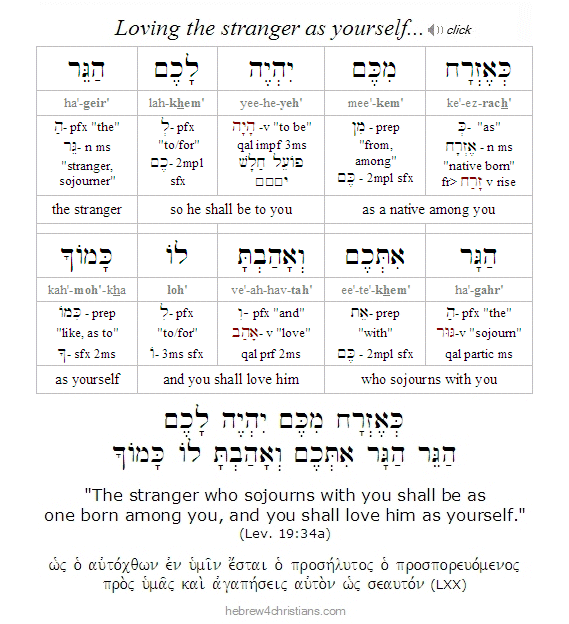|
After taking a census of the clans of the Levites who would help the priests perform their duties at the Mishkan (Tabernacle), Moses instructed the Israelites to remove anyone who was ritually unclean from the camp. He then instructed that anyone who had wronged another to confess their sin, make restitution for the full amount (plus one-fifth), and offer an guilt offering for atonement. Notice, however, that this law of restitution applied not only to one's fellow Jew, but also to "strangers" (i.e., gerim: גֵּרִים) as is indicated by the immediately following verse: "But if the man has no next of kin to whom restitution may be made for the wrong, the restitution shall go to the LORD..." (Num. 5:8). The sages ask, "Is there anyone in Israel who has no next of kin - no brother, no nephew, no distant relation going back to Jacob? This can only refer, therefore, to a stranger, since he has no heirs" (Sifrei). If for some reason the stranger cannot be compensated for his loss, restitution must be made to the LORD, which implies that stealing from the stranger is to steal from God Himself.
Recall that the "mixed multitude" (i.e., erev rav: עֶרֶב רַב) were those Gentiles who tagged along with Israelites during the Exodus from Egypt. Like the Jewish people, they had left everything behind them in the hope of finding a new life of freedom. When the Israelites were camped at Sinai and the tribes were brought into formation, however, there seemed to be no provision made for these people. Indeed, these "strangers" were social outcasts from the camp of Israel who were ineligible to serve in the army or to partake in the services of the Tabernacle. There is no mention of their location among the camps of Israel, nor is there any census recorded of their numbers. We can only surmise that they lived a hardscrabble existence as they wandered with the camp of Israel in the desert...
The midrash sees a direct connection between the expulsion of the unclean among the camp of Israel and the law of restitution as applied to the stranger: "For them that honor Me, I will honor, and them that despise Me shall be lightly esteemed" (1 Sam. 2:30). Who were those who honored God? The proselytes... Who were those who despised God? Those who worshipped the Golden Calf. How did God repay them? He smote them with leprosy and venereal disease and expelled them from the camp. How did God honor the proselytes in return? He inserted the section warning us to look after them immediately following the section dealing with expelling the lepers from the camp. From this we learn that God repels the sinners of Israel while befriending the proselytes who seek Him. They are protected by the same law as the Israelite, and whoever takes from them by violence is dealt with just as if he had taken from an Israelite" (Bamidbar Rabbah 8:3).
So even at the very beginning of Israel's national history we see God's care for the "stranger" who dwelled among his people. Regarding the law of Passover, the LORD stated, "There shall be one law (תּוֹרָה אַחַת) for the native and for the stranger who sojourns among you" (Exod. 12:49). "You shall treat the stranger who sojourns with you as the native among you, and you shall love him as yourself" (Lev. 19:34). The sages ask, why does God love the stranger? Because they have no hereditary or family title. If someone truly wants to become a righteous person, God honors them as if they were the very priests of Israel. Proselytes are what they are simply out of love for God, just as Ruth was made a mother of the Messiah by means of her love for God alone. As it is written, "The LORD loves the righteous; He protects the stranger."
יְהוָה אהֵב צַדִּיקִים יְהוָה שׁמֵר אֶת־גֵּרִים
יָתוֹם וְאַלְמָנָה יְעוֹדֵד וְדֶרֶךְ רְשָׁעִים יְעַוֵּת
Adonai · o·hev · tzad·di·kim, · Adonai · sho·mer · et · ge·rim
ya·tom · ve·al·ma·nah · ye·o·ded, · ve·de·rekh · re·sha·im · ye·av·vet

"The LORD loves the righteous; the LORD watches over the strangers; he upholds the widow and the fatherless, but the way of the wicked he turns upside down."
(Psalm 146:8-9)

Concerning the obligation to love the stranger and treat him with righteousness, Rabbi Jeremiah said: "How can you know that the Gentile that practices the law is equal to the high priest? Because it is said, "which, if a man do, he shall live through them" (Lev. 18:5). And it says, "This is the Torah of man" (2 Sam. 7:19). It does not say, "the law of the priests, Levites, Israelites," but "This is the law of man (תּוֹרַת הָאָדָם), O Lord God." And it does not say, "Open the gates and let the priests and Levites and Israel enter," but it says: "Open the gates that the righteous may enter" (Isa. 26:2). And it says, "This is the gate of the Lord, the righteous shall enter it." It does not say, "The priests and the Levites and Israel shall enter it" (Psalm 118:20). And it does not say, "Rejoice you, priests, Levites, and Israelites," but it says,"Rejoice you righteous" (Psalm 33:1). And it does not say, "Do good, O Lord, to the priests and the Levites and the Israelites," but it says "Do good, O Lord, to the good" (Psalm 125:4). So even a Gentile, if he practices the Torah, is equal to the high priest (Sifra 86b; Baba Kamma 38a).
Regarding the law of the stranger, there are two applications. First, we should remember that "outsiders" are beloved by God and often present a challenge to our supposed identity as God's favored children. The "caste system" within ancient Judaism was intended to humbly serve the greater community, just as Yeshua likewise taught us to love one another, and "if anyone would be first, he must be last of all and servant of all" (Mark 9:35). After all, the primary role of a "priest" was to enable others to draw near to the Divine Presence, not to exclude them from it, and those who serve God in the truth will always seek to heal the sense of "estrangement" from God. Secondly, those who were not raised with the benefit of Jewish heritage but who have genuinely laid hold of Yeshua as their Mashiach and Savior "have a place at the table" in God's Kingdom. "Remember that you were at that time separated from the Messiah, alienated from the commonwealth of Israel and strangers (gerim) to the covenants of the promise, having no hope and without God in the world. But now in Yeshua the Messiah you who once were far off have been brought near by the blood of Messiah. For he himself is our shalom, who has made us both one and has broken down in his flesh the dividing wall (mechitzah) of hostility, by destroying in his own body the enmity required by the Torah with its commandments and ordinances. He did this in order to create in union with himself from the two groups a single new humanity and thus make shalom, in order to reconcile to God both in a single body that was executed upon the cross by killing that enmity. For through the Messiah we both have access in one Spirit to the Father. So then you are no longer strangers and aliens, but you are fellow citizens with the saints and members of the household of God" (Eph. 2:12-20).
A "stranger" is anyone from whom we would withhold genuine respect and love. As Martin Buber once wrote, it is only through the "thou" a person becomes "I." In other words, we are incomplete people if we live in fear of others and deny their essential dignity and worth before our Heavenly Father. We can't regard someone else as a stranger without becoming a stranger ourselves... The message of our hope is "God so loved the world," but that world includes the habitation of many who are strangers to the grace and kindness of God. God has commissioned us to be emissaries of his grace and love to the world of the stranger... May we heed the call welcome all who are thirsty to come and drink from the waters of life.
Hebrew Lesson
Lev. 19:34a reading (click):
 |
|




